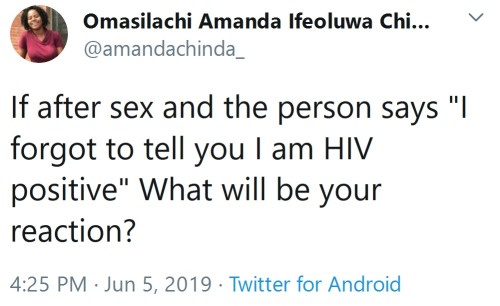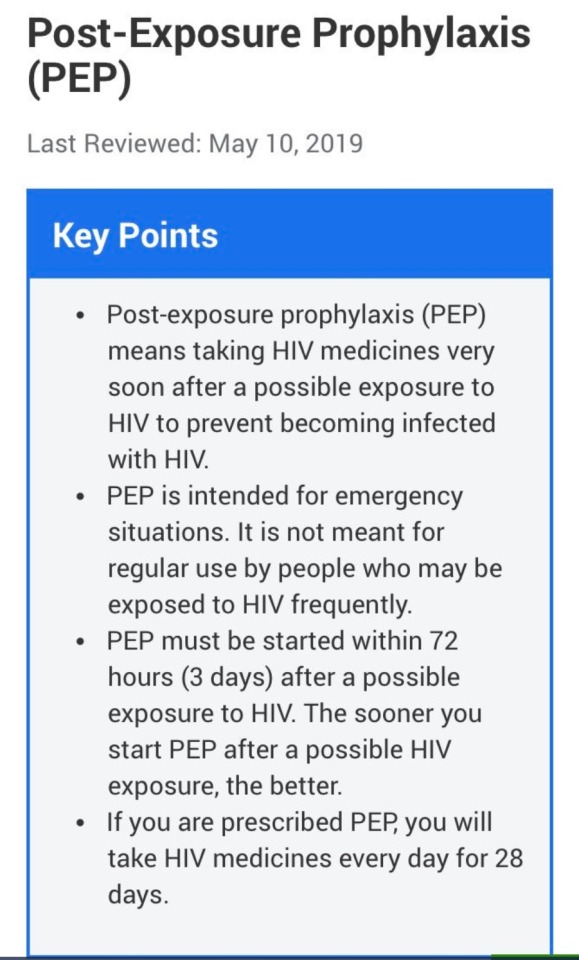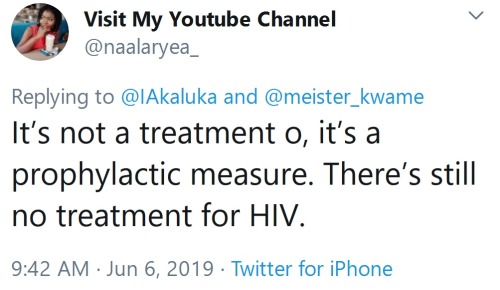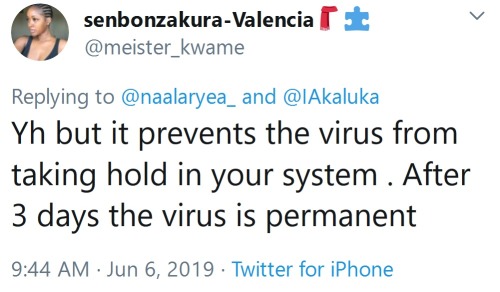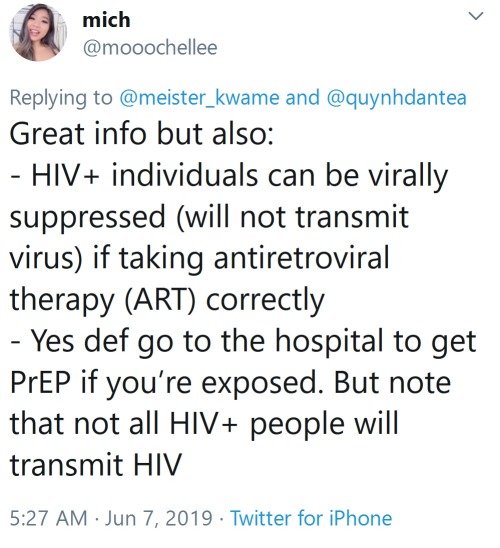In Recent Years, Google Users Have Developed One Very Specific Complaint About The Ubiquitous Search

In recent years, Google users have developed one very specific complaint about the ubiquitous search engine: They can’t find any answers. A simple search for “best pc for gaming” leads to a page dominated by sponsored links rather than helpful advice on which computer to buy. Meanwhile, the actual results are chock-full of low-quality, search-engine-optimized affiliate content designed to generate money for the publisher rather than provide high-quality answers. As a result, users have resorted to work-arounds and hacks to try and find useful information among the ads and low-quality chum. In short, Google’s flagship service now sucks.
And Google isn’t the only tech giant with a slowly deteriorating core product. Facebook, a website ostensibly for finding and connecting with your friends, constantly floods users’ feeds with sponsored (or “recommended”) content, and seems to bury the things people want to see under what Facebook decides is relevant. And as journalist John Herrman wrote earlier this year, the “junkification of Amazon” has made it nearly impossible for users to find a high-quality product they want — instead diverting people to ad-riddled result pages filled with low-quality products from sellers who know how to game the system.
All of these miserable online experiences are symptoms of an insidious underlying disease: In Silicon Valley, the user’s experience has become subordinate to the company’s stock price. Google, Amazon, Meta, and other tech companies have monetized confusion, constantly testing how much they can interfere with and manipulate users. And instead of trying to meaningfully innovate and improve the useful services they provide, these companies have instead chased short-term fads or attempted to totally overhaul their businesses in a desperate attempt to win the favor of Wall Street investors. As a result, our collective online experience is getting worse — it’s harder to buy the things you want to buy, more convoluted to search for info
More Posts from A-mess-of-links and Others
figured out a way you can search for posts that are tagged TWO things on a blog!!! feeling clever
for anyone else who didn’t know, this is the format!:
https://[blogURL].tumblr.com/search/%23[tag1]%2C%20%23[tag2]
remove the [brackets] when using it!
some new additions to my google drive recently ◠ ◡ ◠
lanscape in the mist (1988) dir. theo angelopoulos
the full monty (1997) dir. peter cattaneo
gormenghast (2000), complete series
the romance of astrea and celadon (2007) dir. éric rohmer
the personal history of david copperfield (2019) dir. armando iannucci
belle (2021) dir. mamoru hosoda

does anyone know if i can like block sites from appearing in my google images searches??? i keep getting those awful ai generated things with a hand coming out of a man's neck and just straight up not what i was looking for, because this was in a search for "curly hair in medieval paintings". it happens every time i search for anything vaguely art-reference-like and it's so fucking annoying and it clutters my search results so much. i don't wanna add specific commands to the query every time too, what i need is like a browser extension or something









FISH is a beautiful & incredibly weird metaphysical exploration of life, the Universe & everything!
Read More & Play The Full Game, Free (Windows)
F*c&!ng First Aid: A Quick Guide to Common Sex Injuries

New from our founder, Heather Corinna, a guide for those sexual times that wind up more “ow” than “oooh.”
It’s remarkably easy to hurt ourselves in the pursuit of feeling good. From genital abrasions to broken skin to pulled muscles to infections to allergic reactions, even fractures or breaks, exploring our bodies and their capacities sexually can sometimes mean finding out what’s past a bodies’ limits. We can think there was enough lube, but who among us (cough) hasn’t found out at least once that there wasn’t? We can forget that when it feels to us like we couldn’t possibly get enough of something, our body parts may have an entirely different and considerably threshold (um). Heck, you can hurt yourself just getting a date a glass of water (says my once-broken toe, bitterly).
For whatever reason (probably a combination of ableism, totally inhumane sexual ideals and maybe some leftover stuff from our DNA way back when we lived a wilder existence), if and when people get hurt during sex, they often feel ashamed or embarrassed, like they have ruined something. Getting hurt in our bodies is as acceptable an experience as feeling good in them. It’s not “weak” to get hurt, and it doesn’t mean anyone failed at anything, it just means we’re living in the body of a mere mortal, not a sexual superhero. So, if some kind of sex injury happens to you or a partner, don’t get hung up in negative feelings about it. Instead, turn your attention to yourself or whoever got hurt. Not only might you or they need physical care, caring for ourselves and each other in attentive, tender ways is only likely to enhance our sexual experiences and the ways we connect to ourselves or one another through them. This kind of care, much like general sexual aftercare, can be something that is a highlight of a sexual experience, even when something painful or bummerful happened which that care is centered around.
This simple guide covers the most common sexual injuries for people in the age group we serve, what needs to be done when and after they have happened, and how you can best prevent them. Read F*c&!ng First Aid: A Quick Guide to Common Sex Injuries over at Scarleteen.
more fat people in shibari! fat stomachs bound up in rope!!!! thighs bulging under complicated ties!!!!! moobs and tits alike squeezed by nylon!!!!! cmon people!!!!!
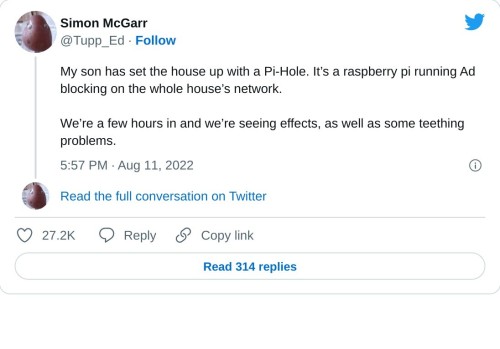
>First, we’ve discovered that about a quarter of all the internet connection in or out of the house were ad related. In a few hours, that’s about 10,000 out of 40,000 processed.
>We also discovered that every link on Twitter was blocked. This was solved by whitelisting the https://t.co domain.
>Once out browsing the Web, everything is loading pretty much instantly. It turns out most of that Page Loading malarkey we’ve been accustomed to is related to sites running auctions to sell Ad space to show you before the page loads. All gone now.
>We then found that the Samsung TV (which I really like) is very fond of yapping all about itself to Samsung HQ. All stopped now. No sign of any breakages in its function, so I’m happy enough with that.
>The primary source of distress came from the habitual Lemmings player in the house, who found they could no longer watch ads to build up their in-app gold. A workaround is being considered for this.
>The next ambition is to advance the Ad blocking so that it seamlessly removed YouTube Ads. This is the subject of ongoing research, and tinkering continues. All in all, a very successful experiment.
>Certainly this exceeds my equivalent childhood project of disassembling and assembling our rotary dial telephone. A project whose only utility was finding out how to make the phone ring when nobody was calling.
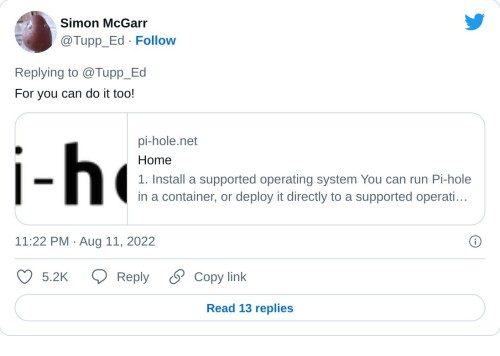
>Update: All4 on the telly appears not to have any ads any more. Goodbye Arnold Clarke!
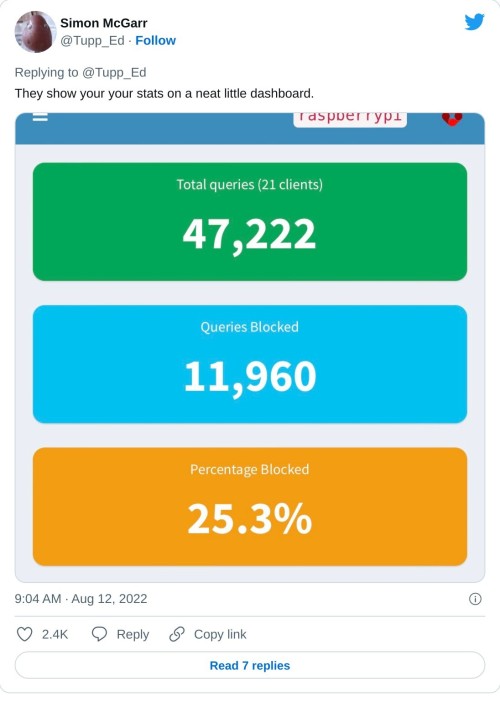
>Lemmings problem now solved.
>Can confirm, after small tests, that RTÉ Player ads are now gone and the player on the phone is now just delivering swift, ad free streams at first click.
>Some queries along the lines of “Are you not stealing the internet?” Firstly, this is my network, so I may set it up as I please (or, you know, my son can do it and I can give him a stupid thumbs up in response). But there is a wider question, based on the ads=internet model.
>I’m afraid I passed the You Wouldn’t Download A Car point back when I first installed ad-blocking plug-ins on a browser. But consider my chatty TV. Individual consumer choice is not the method of addressing pervasive commercial surveillance.
>Should I feel morally obliged not to mute the TV when the ads come on? No, this is a standing tension- a clash of interests. But I think my interest in my family not being under intrusive or covert surveillance at home is superior to the ad company’s wish to profile them.
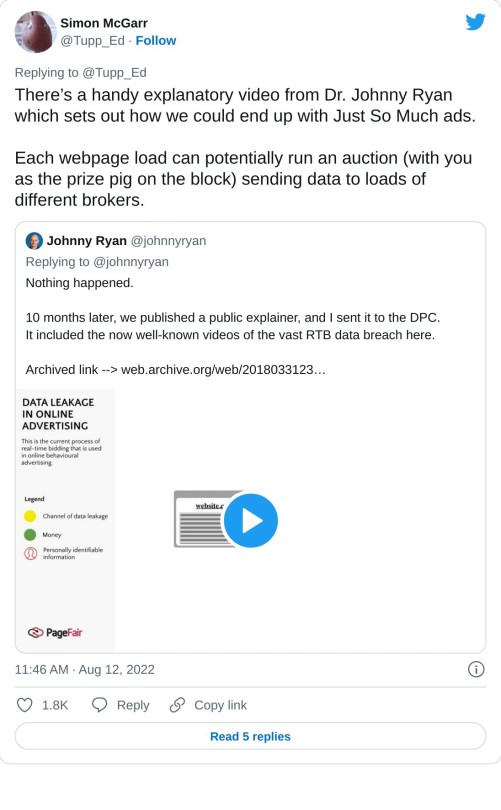
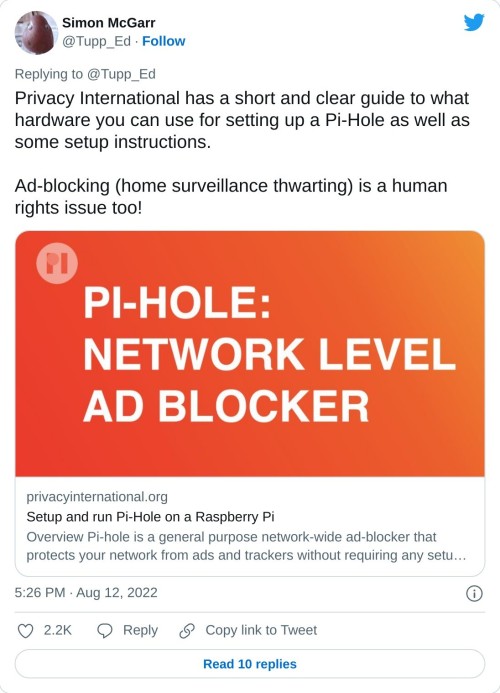
>Aside: 24 hours of Pi Hole stats suggests that Samsung TVs are very chatty. 14,170 chats a day.
>YouTube blocking seems difficult, as the ads usually come from the same domain as the videos. Haven’t tried it, but all of the content can also be delivered from a no-cookies version of the YouTube domain, which doesn’t have the ads. I have asked my son to poke at that idea.
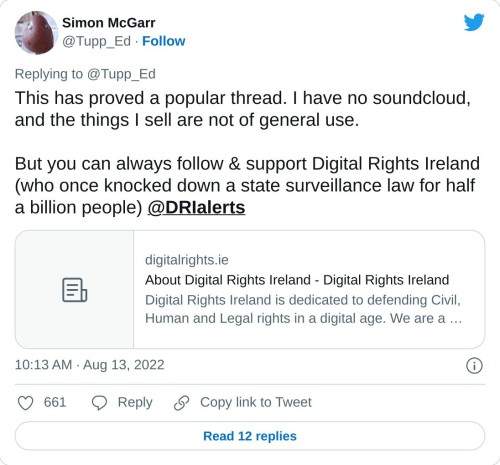
an angel on letterboxd just dropped a whole playlist of films free on youtube I was filled with so much love and light I had to share with you guys
if anyone’s interested in asian cinema, esp southeast asian cinema, check out the asian film archive. you can even submit films for preservation/restoration (according to guidelines), so it’s a great resource for filmmakers, collectors, cinephiles of all stripes :3
-
 usthreemawrtyrs reblogged this · 1 week ago
usthreemawrtyrs reblogged this · 1 week ago -
 starcrushhologram liked this · 2 weeks ago
starcrushhologram liked this · 2 weeks ago -
 pluckingstarsoffmoontrees liked this · 1 month ago
pluckingstarsoffmoontrees liked this · 1 month ago -
 thisuserisnotsurewhotheyare reblogged this · 2 months ago
thisuserisnotsurewhotheyare reblogged this · 2 months ago -
 rainbowlimenade reblogged this · 2 months ago
rainbowlimenade reblogged this · 2 months ago -
 rainbowlimenade liked this · 2 months ago
rainbowlimenade liked this · 2 months ago -
 vampireautism liked this · 2 months ago
vampireautism liked this · 2 months ago -
 thelorewriter-inator reblogged this · 2 months ago
thelorewriter-inator reblogged this · 2 months ago -
 thelorewriter-inator liked this · 2 months ago
thelorewriter-inator liked this · 2 months ago -
 rhialinerose liked this · 2 months ago
rhialinerose liked this · 2 months ago -
 loveeliesbleeding reblogged this · 2 months ago
loveeliesbleeding reblogged this · 2 months ago -
 acraustic liked this · 3 months ago
acraustic liked this · 3 months ago -
 furnace43 liked this · 3 months ago
furnace43 liked this · 3 months ago -
 ladydianaphotos liked this · 3 months ago
ladydianaphotos liked this · 3 months ago -
 wehaveallbeenmarkled reblogged this · 3 months ago
wehaveallbeenmarkled reblogged this · 3 months ago -
 missmannersposts reblogged this · 3 months ago
missmannersposts reblogged this · 3 months ago -
 missmannersposts liked this · 3 months ago
missmannersposts liked this · 3 months ago -
 rn7rocks liked this · 3 months ago
rn7rocks liked this · 3 months ago -
 wehaveallbeenmarkled reblogged this · 3 months ago
wehaveallbeenmarkled reblogged this · 3 months ago -
 blackvelvetcrowbar liked this · 3 months ago
blackvelvetcrowbar liked this · 3 months ago -
 one-hit-boy-wonder liked this · 3 months ago
one-hit-boy-wonder liked this · 3 months ago -
 stormyromance liked this · 3 months ago
stormyromance liked this · 3 months ago -
 hungryriverbeast liked this · 3 months ago
hungryriverbeast liked this · 3 months ago -
 ghostof1705 reblogged this · 3 months ago
ghostof1705 reblogged this · 3 months ago -
 thecourtoflionsandwolves liked this · 3 months ago
thecourtoflionsandwolves liked this · 3 months ago -
 judicatorypedant reblogged this · 3 months ago
judicatorypedant reblogged this · 3 months ago -
 soontheendwillcall liked this · 3 months ago
soontheendwillcall liked this · 3 months ago -
 esgargoth liked this · 3 months ago
esgargoth liked this · 3 months ago -
 minitrashwarrior liked this · 4 months ago
minitrashwarrior liked this · 4 months ago -
 subtle-codpiece liked this · 4 months ago
subtle-codpiece liked this · 4 months ago -
 lovelyrose20 reblogged this · 4 months ago
lovelyrose20 reblogged this · 4 months ago -
 lovelyrose20 liked this · 4 months ago
lovelyrose20 liked this · 4 months ago -
 thesnakesstuff reblogged this · 4 months ago
thesnakesstuff reblogged this · 4 months ago -
 lovely--an0n reblogged this · 4 months ago
lovely--an0n reblogged this · 4 months ago -
 killjillthegreat reblogged this · 4 months ago
killjillthegreat reblogged this · 4 months ago -
 backpackingspace reblogged this · 4 months ago
backpackingspace reblogged this · 4 months ago -
 little-cereal-draws reblogged this · 4 months ago
little-cereal-draws reblogged this · 4 months ago -
 lovenfever reblogged this · 4 months ago
lovenfever reblogged this · 4 months ago -
 neptt00n liked this · 4 months ago
neptt00n liked this · 4 months ago -
 rippledawn liked this · 4 months ago
rippledawn liked this · 4 months ago -
 no32557038 liked this · 4 months ago
no32557038 liked this · 4 months ago -
 aspiringtobesomethings liked this · 4 months ago
aspiringtobesomethings liked this · 4 months ago -
 blindreblogs2areblog reblogged this · 4 months ago
blindreblogs2areblog reblogged this · 4 months ago
